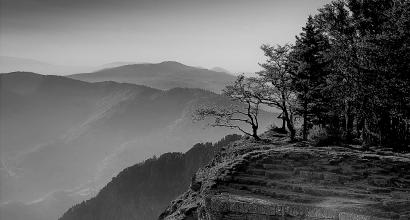Tradition of Kshaatra in India: Unbridled Barbarianism of Alauddin Khilji and Timur
A Muslim could silence a Hindu as per whim and hurl abuses on him without any repercussions. And as for a Hindu, he had to quietly swallow all humiliation without showing the slightest resentment. Ibn Batuta writes, "After defeating and destroying a king, one has to get the queen and the princesses to sing and dance in a filled assembly; and whoever desires them, they must be given away." He says that it was a common feature of Islamic imperialism to torture the common women and children and also share them with all the Muslim men publicly. Further he says, "I too got many such slaves. I got tired of sharing them with others. After that I don't know what happened to them."
Hindu couldn't build new temples; old temples must not be repaired or revived. A huge jeziya tax was imposed on anyone wishing to take a pilgrimage. There was even a tax to get married. These rules were so draconian that in Mathura, nobody had the rights to have a hair-cut or a shave!
The Muslims knew only warfare, bloodshed, and constant battle; they knew nothing about emotionally rich aspects of life like arts and crafts or any other things of beauty. Because Hindus were excellent traders and businessmen, the Muslims would squeeze every last penny from them; and the Hindus would give it to them. Their actions were as cruel as keeping a dead calf in front of a milch cow and milking it, or even worse, using a machine to draw milk and blood from the udders of the cow.
"With a view to restrict the Islamic enthusiasm of victory, Hindus slowly began developing strategies. Whenever necessary, they would reconcile with the kings; when things were uncertain, they even offered service. But in their individual homes, in their community, in their society, in their religious activities they never allowed any sort of blemish."
We find just a few references to re-converting people back to Hinduism, for example, Devalasmriti, Vidyaranya's Panchadashi, etc. However, this [what is now called Ghar Wapsi] happened in a very small scale. It is heartening to know that such activities took place all the way up to the times of Gagabhatta and Shivaji. However, it is sad that such an act did not become a full-fledged movement.
"The Dharmashastras attained more sanctity. Social ostracization and boycott became even more common. Women were further sidelined. Child marriages became the order of the day. The practice of Sati became common. 'Sacrifice of one's life is the greatest' - this sort of self-destructive tendencies set in. There was a huge obstacle for the free mixing of different jaatis. The social stratification ensured that the lower jaatis never had the opportunities to rise higher in the ladder and reach a higher status; it became stagnant."
The words of Manu, "Braahmanah shoodrataam yaati, shoodro yaati cha viprataam," were forgotten. Shudras never had the opportunity to rise to the level of, say, Ksatriyas or take up some other activities.
"Hindus were extremely skilled in business, commerce, trade, loaning money, and other financial activities. However blind a Muslim was in his religious bigotry, he had to be on good terms with a Hindu vaisya, giving him due respect. There is no doubt that such respect was purely driven by selfishness. Foreign traders followed suit. All trade in the Western Ocean [i.e. the Arabian Sea] was controlled by Hindus. The bloodthirsty Muslim youth had realized that without material strength, living a life of sensual indulgences is counter-productive. To avoid getting physically tortured or hassled by the Muslims, many of the Hindu moneylenders would not hesitate to give them a handful of money.
Thus, even when the Islamic armies were at their barbaric best, Indian was a land of the brave.
Al-Idris, a Muslim historian says, "Hindu businessmen had become famous for their sense of justice, integrity, and expertise in work. Even Marco Polo praised the great businessmen of southern Gujarat." "These baniya-brahamanas are the best in the world and the most trustworthy. They will not utter a lie for anything in this world. And whatever they say is the truth!" This is what Marco Polo, the great traveller and trader-companion, had to say about the businessmen of southern Gujarat. This was the state of India when the Islamic forces attacked first. Even traders who would roam about the world had a great value system. Sanatanadharma has been creating this sort of sustainable systems right from the beginning. Kshaatra stood as the backbone of this; and all this was influenced by the idealism of Braahma.
During the time of Allaudin Khilji, the Islamic rule obtained a hitherto unknown cruelty and horror. Khilji was capable and strong. But his skill and strength were such that they brought untold horror and torture upon his people. He was the first person to establish a strong Islamic empire in India. Even so, he did not rule for more than twenty years. The Tughlaq dynasty that succeeded him did not last even a decade in a stable manner. While these rulers did not have a long reign, the sort of damage they were able to do, the violence they subjected the people to, and the amount of looting and pillaging they did are of an extreme kind.
Like the proverb "Ashakto'ham grhaarambhe shakto'ham grhabhanjane" (Though I don't have the strength to build a house, I have the strength to destroy one) they proved to be disastrous for the people. Just like a drop of poison spoils an entire tub of milk, their short-lived reigns proved to be poisonous for Indians for a long time.
All these Muslims rulers, as easily and quickly as they rose to power and ascended the throne, they fell down with the same ease and speed. After these kings, Timur invaded India through Kambhoja. Historians say that there is no match to his violence, cruelty, and barbarity. Timur writes in his autobiography, "The aim of my life is to destroy the kafirs; I must establish Islam firmly everywhere; I am a Ghazi, a warrior for my religion; I will loot and pillage everything that belongs to kafirs." R C Majumdar refers to this in his writings. At that point of time, the Islamic empire in Delhi was weak. It was during such a time that Timur attacked India.
"Almost as if it is a historian's good fortune, he records all his horrific misdeeds and dark acts in his autobiography. Else, it would extremely difficult for anyone to even believe the sort of depraved and anti-human acts of his. He carried out all his depraved acts in the name of his religion and it is difficult for anyone to even imagine the sort of violence and brutality that he engaged in or his unbridled lust and desire or his countless murders, pillages, and acts of destruction. How to spell out in words his gory and terrifying acts, which he carried out till the very end?"
When he attacked Delhi and waged war, upon hearing that there were people who rejoiced when he was in a weak position, he brought together a hundred thousand people in one place and had them all killed. Timur had such a beastly attitude that he picked a man known for his sattvik nature, one who would not even hurt a bird, and place a knife in his hand and forced him to kill fifteen kafirs.
R C Majumdar further says, "As attempts have been recently made to minimize and explain away his enormity, the account of his unmitigated barbarity has been given in some detail, as far as possible in his own words, in this volume."















































